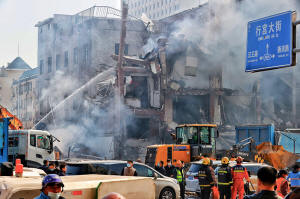Media harassment after China restaurant blast sparks protest, public
criticism
 Send a link to a friend
Send a link to a friend
 [March 14, 2024]
BEIJING (Reuters) - The association overseeing Chinese
journalists issued a rare statement of protest after reporters were
blocked by local residents and security guards while trying to report on
the aftermath of a blast outside Beijing. [March 14, 2024]
BEIJING (Reuters) - The association overseeing Chinese
journalists issued a rare statement of protest after reporters were
blocked by local residents and security guards while trying to report on
the aftermath of a blast outside Beijing.
A powerful explosion on Wednesday morning suspected to have been
triggered by a gas leak at a fried chicken shop in Sanhe, a city in
Hebei province adjacent to Beijing, ripped off the facade of nearby
buildings, killed seven people and injured 27 others.
As reporters arrived at the scene, including from state-run radio and
television as well as foreign journalists based in Beijing, some were
verbally challenged by crowds and physically prevented from conducting
interviews or filming.
A video clip on Chinese social media showed two men in black uniforms
blocking the camera of a reporter from state television CCTV as she
attempted to conduct a live interview. Another showed a reporter from
China's state radio saying she was being pushed about by more than a
dozen people.
News is highly controlled in China due to concerns of social stability
and national security, but it is unusual for state journalists to be
prevented from reporting in public.

Local governments should support reporters in their work after a major
emergency incident, the All-China Journalists Association (ACJA),
overseen by China's Communist Party, said in a statement on Wednesday
following the Sanhe explosion.
"They must not obstruct the normal duties of reporters in a simple and
rough manner just to control public opinion," ACJA said in a rare
defense of reporters' right to report.
The treatment of journalists belonging to state-run broadcasters at the
Sanhe blast prompted concerned posts on Weibo, China's popular but
heavily censored messaging platform.
[to top of second column]
|

Firefighters work to put out a fire following an explosion at a
restaurant in Sanhe, Hebei province, China March 13, 2024. China
Daily via REUTERS/File Photo

"Even CCTV reporters were subjected to this, let alone other media,"
wrote one Weibo user. "If mouths are covered during a prominent
public safety incident such as this, what can be said of other
public incidents?"
Sanhe's government, in a statement on Thursday, apologized for the
"poor communication skills" of front-line staff as they tried to
persuade reporters to leave due to the risk of another gas leak.
"We are deeply aware that safeguarding the legitimate reporting of
journalists is needed to satisfy the public's right to know," the
statement said.
Foreign reporters are sometimes harassed, including physically, by
ordinary citizens who say foreign journalists are out to smear
China's image.
In 2021, some foreign journalists complained of being harassed and
threatened by civilians while covering floods in central China,
prompting the International Federation of Journalists to urge
authorities to ensure journalists can report safely and
independently.
China's government says it welcomes foreign media to report on China
provided they followed the law.
(Reporting by Ryan Woo, Editing by Raju Gopalakrishnan)
[© 2024 Thomson Reuters. All rights reserved.]This material
may not be published, broadcast, rewritten or redistributed.
Thompson Reuters is solely responsible for this content.
 |